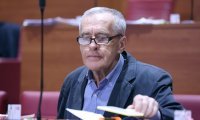Hungary took over the six-month rotating presidency of the European Union from Belgium on 1 January, with Hungarian officials stating that one of priorities of the Hungarian EU presidency's agenda is the completion of Croatia's accession negotiations in the first half of 2011.
The Hungarian Presidency will do everything it can to conclude the accession talks with Croatia during the first half of 2011, Hungarian Foreign Minister Janos Martonyi said when he recently outlined the agenda of the Hungarian chairmanship over the European bloc in Brussels,
During his recent visit to Zagreb Hungarian Deputy Prime Minister Tibor Navracsics has said that Budapest will not deem its EU presidency successful if Croatia does not manage to wrap up the entry negotiations by mid-2011.
So far, Croatia has opened all negotiating chapters and managed to close a majority of them. The remaining seven policy chapters to be closed are: Competition Policy, Agriculture and Rural Development, Fisheries, Regional Policy and the Co-ordination of Structural Instruments, Judiciary and Fundamental Rights, Finance and Budgetary Provisions, and Other Issues. The completion of this job depends primarily on the country's fulfilment of criteria for Competition Policy and for Judiciary and Fundamental Rights.
The motto of the Hungarian presidency is "Strong Europe with a Human Touch".
Some specific tasks the Hungarian presidency will be to ensure agreement on EU financial governance laws, as well as to propose budget frameworks of the bloc in 2014-2020 period. Budapest advocates the preservation of the cohesion policy and the joint agricultural policy.
The European Union's strategy for Danube basin countries is expected to be adopted towards the end of the Hungarian EU presidency. This will usher in the second macroregion, after the establishment of the Baltic macroregion. The Danube macroregion consists of 14 countries including Croatia. They are encouraged to improve the use of their resources with an aim of developing the region's potentials.
Hungary advocates the admission of Bulgaria and Romania to the Schengen zone but this is being opposed by Germany and France that hold that the entry of those two EU members to the Schengen area would be still too early.
Hungary will host the second Eastern Partnership Summit in May 2011. Eastern Partnership is aimed at improving the political and economic relations between the six Post-Soviet states -- Ukraine, Belarus, Moldova, Azerbaijan, Armenia and Georgia -- and the European Union.
Hungary also attaches importance to the integration of the Roma-people at the European level. There are between 10-12 million people of that ethnic descent in Europe.
The presidency over the 27-strong EU bloc is a great test for the Hungarian public administration. In the first six months, 260 conferences, meetings and other events are due to be held, and a majority of them will take place in the royal palace in the town of Godollo, about 30 kilometres of Budapest. The palace, built for aristocratic Anatal Grassalkovich, was later used by Franz Josef, Emperor of Austria and King of Hungary and his wife Elisabeth ("Sisi") as their summer residence.
Poland assumes the EU presidency on 1 July 2011.
































